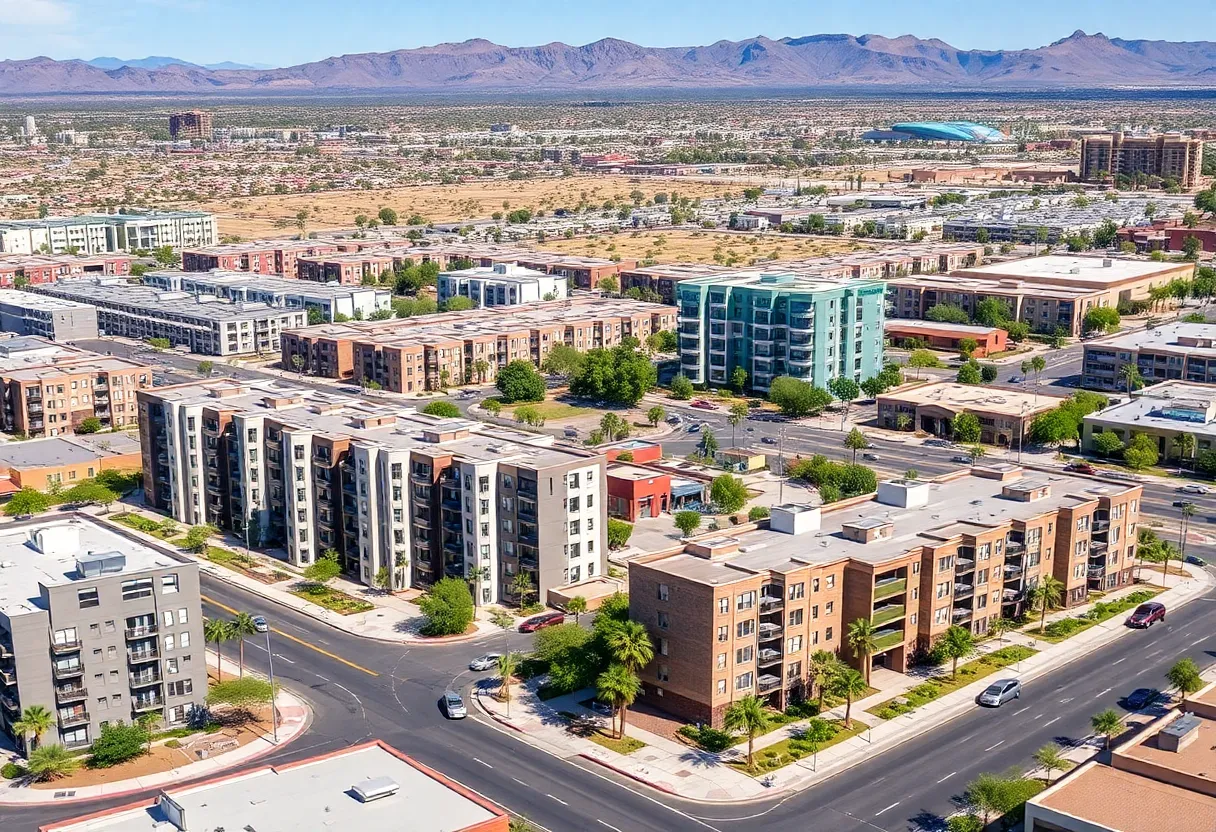News Summary
Metro Phoenix is currently facing a multifamily housing market imbalance as a surge in construction struggles to meet soaring demand for rental units. With migration rates high and evolving job opportunities, the region saw the construction of around 10,000 units in 2022, potentially rising to 28,000 by 2025. Despite the increase, experts question whether the market is overbuilt, given a historical shortfall of 84,000 units over 12 years. Rising rents and demographic shifts suggest a complex future for the market.
Metro Phoenix is experiencing a multifamily housing market imbalance as a significant increase in construction meets the region’s soaring demand for rental units. High migration rates and evolving job opportunities have spurred unprecedented demand, leading to higher rents and diminishing affordability in an area that has become a commercial hub, particularly following the pandemic.
The surge in multifamily housing construction is a response to this heightened demand. In 2022 alone, approximately 10,000 units were constructed, and projections indicate that this number could rise dramatically to 28,000 units by 2025. Despite these efforts, experts remain uncertain about whether the market is overbuilt or still underbuilt, with some indicating that Greater Phoenix may be in need of more rental units.
Historically, the demand for housing in the Phoenix area has outpaced supply. For over 12 years, the region required around 12,000 housing units annually, yet only 8,000 units were added during that span, resulting in a cumulative shortfall of 84,000 units. With the recent uptick in construction, vacancy rates have started to increase, leading to lower rents in the competitive rental market.
Migration and Economic Growth
Metro Phoenix is experiencing a population boom, with Maricopa County being the third fastest-growing county in the United States as of 2024. Many new residents are flocking to the area from California, the Midwest, and other parts of the country, primarily drawn by the promise of job opportunities and housing affordability.
This increase in population is directly linked to Arizona’s economic diversification, particularly in sectors such as advanced manufacturing, biotechnology, and healthcare. Before the pandemic, Phoenix outpaced the national job growth average with an annual rate of 4% compared to almost 3% nationwide. After a swift job recovery post-pandemic, the local job market has seen a slight slowdown as of late 2024, causing companies to adopt a more cautious approach to hiring.
Shifting Rental Demographics
Despite some declines in consumer confidence, linked to macroeconomic factors such as tariffs and monetary policy uncertainties, the rental market remains strong. In the last four quarters, nearly 18,000 rental units were absorbed, double the levels seen before the pandemic. This points to a healthier balance between supply and demand, as more units were absorbed than delivered earlier this year.
Moreover, the rental demographic landscape is undergoing shifts, with younger individuals increasingly opting for apartments instead of purchasing homes. The rise in home prices— which surged 65% from Q4 2019 to Q1 2025—alongside escalating mortgage rates, have further pushed housing ownership out of reach for many, making rentals a more desirable option.
Market Predictions and Future Outlook
Currently, approximately 55% of rental properties in the area are offering discounts or incentives to attract potential renters, including promotional offers of up to eight weeks of free rent at newer complexes located in high-growth areas. As more supply enters the market, increased vacancy rates have resulted in a competitive landscape among landlords trying to fill units.
Looking ahead, experts warn that the Phoenix multifamily market could face a shortage of units once the rate of new construction begins to decline in the coming years. It is anticipated that the market may stabilize within the next 12 to 18 months, with potential increases in rents as the correction process unfolds.
In summary, the multifamily housing market in Metro Phoenix is likened to a rollercoaster ride, characterized by volatility and oscillation between high and low demands. Despite challenges, the area’s enduring appeal and sustained economic growth suggest that the market will continue to evolve in the months and years ahead.
Deeper Dive: News & Info About This Topic
HERE Resources
Jim Hartnett Elected as Fellow of American College of Construction Lawyers
Phoenix Faces Intensifying Affordable Housing Crisis
Arizona Superintendent Seeks $180 Million for School Safety Program
Record Attendance at Waste Management Phoenix Open Raises Eyebrows in Golf
Luxury Golf Home in Scottsdale Features 18-Car Garage
PNC Financial Services Group Acquires FirstBank for $4.1 Billion
PNC Financial Services to Acquire FirstBank for $4.1 Billion
Luxury Scottsdale Home for Car Lovers Listed at $6.95 Million
Phoenix Construction Market Sees Targeted Growth Amid Tariff Pressures
Mark Campbell Wins Pay Tribute to a Teacher Award
Additional Resources
- AZ Big Media
- CoStar
- Multifamily Dive
- NorthMarq Insights
- CB Insights
- Wikipedia: Phoenix, Arizona
- Google Search: Phoenix multifamily housing market
- Google Scholar: Metro Phoenix housing trends
- Encyclopedia Britannica: Phoenix, Arizona
- Google News: Phoenix real estate trends

Author: STAFF HERE PHOENIX WRITER
The PHOENIX STAFF WRITER represents the experienced team at HEREPhoenix.com, your go-to source for actionable local news and information in Phoenix, Maricopa County, and beyond. Specializing in "news you can use," we cover essential topics like product reviews for personal and business needs, local business directories, politics, real estate trends, neighborhood insights, and state news affecting the area—with deep expertise drawn from years of dedicated reporting and strong community input, including local press releases and business updates. We deliver top reporting on high-value events such as the Waste Management Phoenix Open, Cactus League Spring Training, and Arizona State Fair. Our coverage extends to key organizations like the Greater Phoenix Chamber of Commerce and Visit Phoenix, plus leading businesses in technology and healthcare that power the local economy such as Intel and Banner Health. As part of the broader HERE network, including HERETucson.com, we provide comprehensive, credible insights into Arizona's dynamic landscape.






